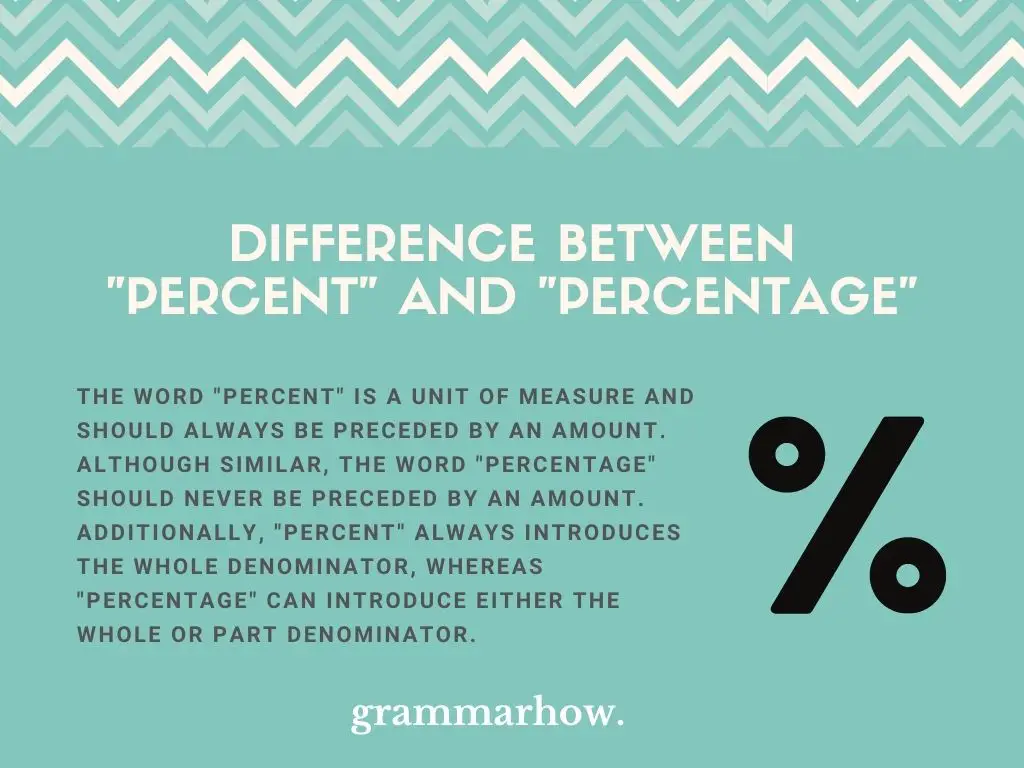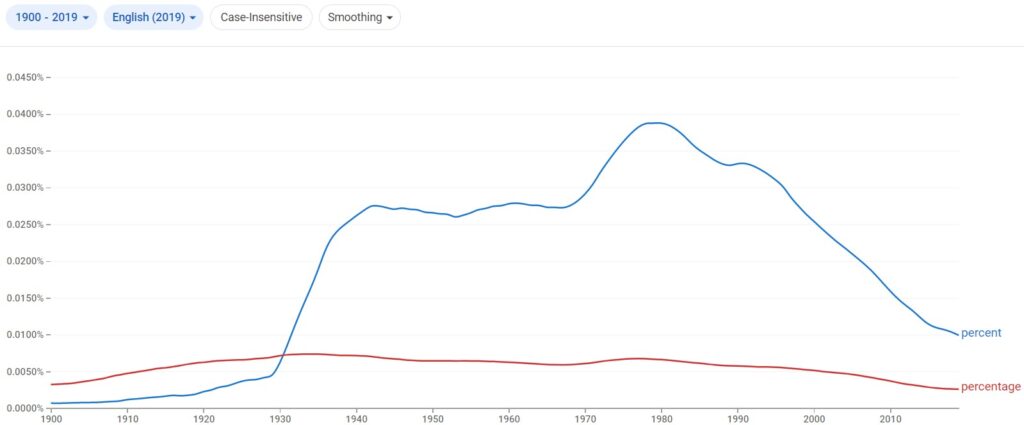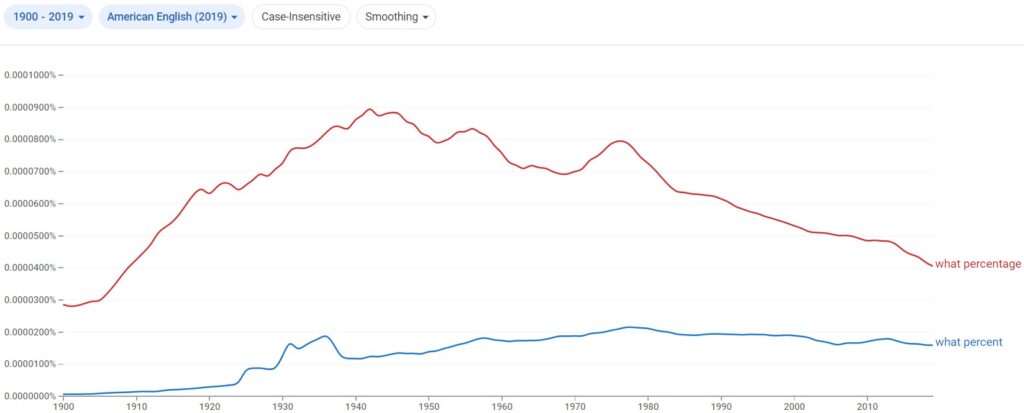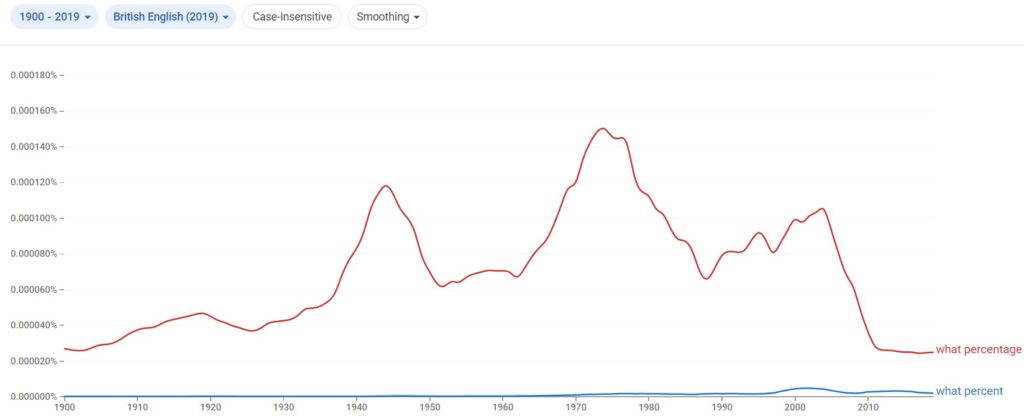The words “percent” and “percentage” are so similar that many people use them interchangeably in conversation and the written word. Here we discuss whether that usage is appropriate and the proper conventions around when you should choose to use each.
What Is The Difference Between “Percent” And “Percentage”?
The word “percent” is a unit of measure and should always be preceded by an amount. Although similar, the word “percentage” should never be preceded by an amount. Additionally, “percent” always introduces the whole denominator, whereas “percentage” can introduce either the whole or part denominator.

The word “percent” can sometimes be used/act as an adverb in a sentence. The word “percentage” is always a noun.
When Should I Use “Percent”?
Use “percent” when you want to indicate a specified amount or one part in every hundred. You must always have a specific amount indicated and that amount must come before the word “percent.”
When indicating a percent in a sentence, you must always write out the number and then follow the number immediately with the word percent (i.e., five percent). You can also choose to write out the number in the numeral form and use the “%” sign immediately after it instead (i.e., 5%).
Both of those options are correct. However, you can not write out the number in words and use the “%” sign and should not use the numeral with the word “percent” (i.e., 5 percent).
These example sentences show the proper usage of the word “percent.”
- In the survey we conducted, only fifteen percent of people were in favor of the changes taking place.
- The class was evenly divided as 50% of the students were boys and 50% were girls.
- The loan has a four percent interest rate for 10 years.
- The suspect claimed he was being one hundred percent truthful when he was questioned by the police.
- That candy bar has 18% sugar in it.
- I got a ninety percent on the geometry test that I took the other day.
- Ninety-five percent of the time I walk to work in the morning, but some days I’m running late and have to drive.
When Should I Use “Percentage”?
Use “percentage” when you are talking about things in a more general sense, or are not referring to a specific number (although it can be a range of specific numbers). The word “percentage” is never preceded by a specific number in a sentence.
When describing a specific range of numbers, the word “percentage” is preceded by the word “the” and followed by the word “of.” Therefore, the complete phrase when using the word “percentage” this way is “the percentage of.”
When the noun “percentage” does not refer to a range of specific numbers in a sentence, it uses the noun determiner “a” instead of “the.” It must also be preceded by an adjective (i.e., large, significant, small) to create a phrase such as “a large percentage of.”
Here are some examples that show “percentage” properly used in a sentence.
- I’d say that the percentage of my paycheck that goes towards food each month is between 25 to 30 percent.
- A large percentage of the population was exposed to the chickenpox virus as a child.
- There will probably be a small percentage of possibility for rain showers in the morning on Saturday.
- Each week, Matt puts a small percentage of his paycheck into a savings account for emergencies.
- I think the percentage of people that didn’t reply to the invitation was about 5% to 10%.
- I’d figure that only a small percentage of people don’t enjoy eating pizza.
Are “Percent” And “Percentage” Interchangeable?
The words “percent” and “percentage” are not interchangeable although they are closely related. The word “percent” must always be used when referring to a specific amount. The word “percentage” must always be used when speaking without a number or for a range of numbers.
Is “Percent” Or “Percentage” Used The Most?
The word “percent” is used more often than the word “percentage,” although both words have been used regularly throughout history.
This Google Ngram Viewer shows the usage of the two words from the year 1900 until today. As you can see, the usage word “percentage” has remained steady through the years.

The word “percent” experienced a significant rise in usage around the year 1930 and continued to rise until it fell back down and started to level out around the year 2014.
Is It “Percent Of” Or “Percentage Of”?
You can use either the phrase “percent of” or “percentage of” depending on the context of your sentence. Keep in mind that the word “percent” must always be preceded by a specific number, even when saying “percent of.”
Here is an example of both phrases used correctly:
- I was told that twenty percent of people surveyed wished they took more vacations.
- The percentage of applicants who didn’t get accepted to the university was 25 to 30 percent.
Is It “What Percent” Or “What Percentage”?
You can use both the phrases “what percent” or “what percentage.” It depends on the answer that you expect to get. If you expect an exact number, “what percent” is appropriate. If you are not looking for an exact number “what percentage” should be used.
You may also like: “How Many Percent”, “How Much Percent”, or “What Percent”?
Is “What Percent” And “What Percentage” Used Differently In The US And The UK?
In both the US and the UK, the phrase “what percentage” is used more often than “what percent.” However, in the UK, the phrase “what percent” is almost never used at all, in the US, it is just used slightly less.
This Google Ngram Viewer shows the usage of the two phrases in American English. As you can see, both phrases are used regularly, even though “what percentage” is used more.

This Google Ngram Viewer shows the UK usage of the two phrases. From this analysis, you can see that the phrase “what percent” is almost non-existent in British English and has been throughout history.

Is It “Percent Point” Or “Percentage Point”?
The proper phrase to use is “percentage point.” A “percentage point” is the mathematical difference between two percentages. However, the answer is not an exact percent, so you would not say “percent point.” For example, a 20% difference in two numbers, could actually equal just 2 “percentage points.”
You may also like:
Do You Put a Space Before a Percent Sign? Full Explanation
Is Percentage Singular or Plural? (Helpful Examples)

Martin holds a Master’s degree in Finance and International Business. He has six years of experience in professional communication with clients, executives, and colleagues. Furthermore, he has teaching experience from Aarhus University. Martin has been featured as an expert in communication and teaching on Forbes and Shopify. Read more about Martin here.
